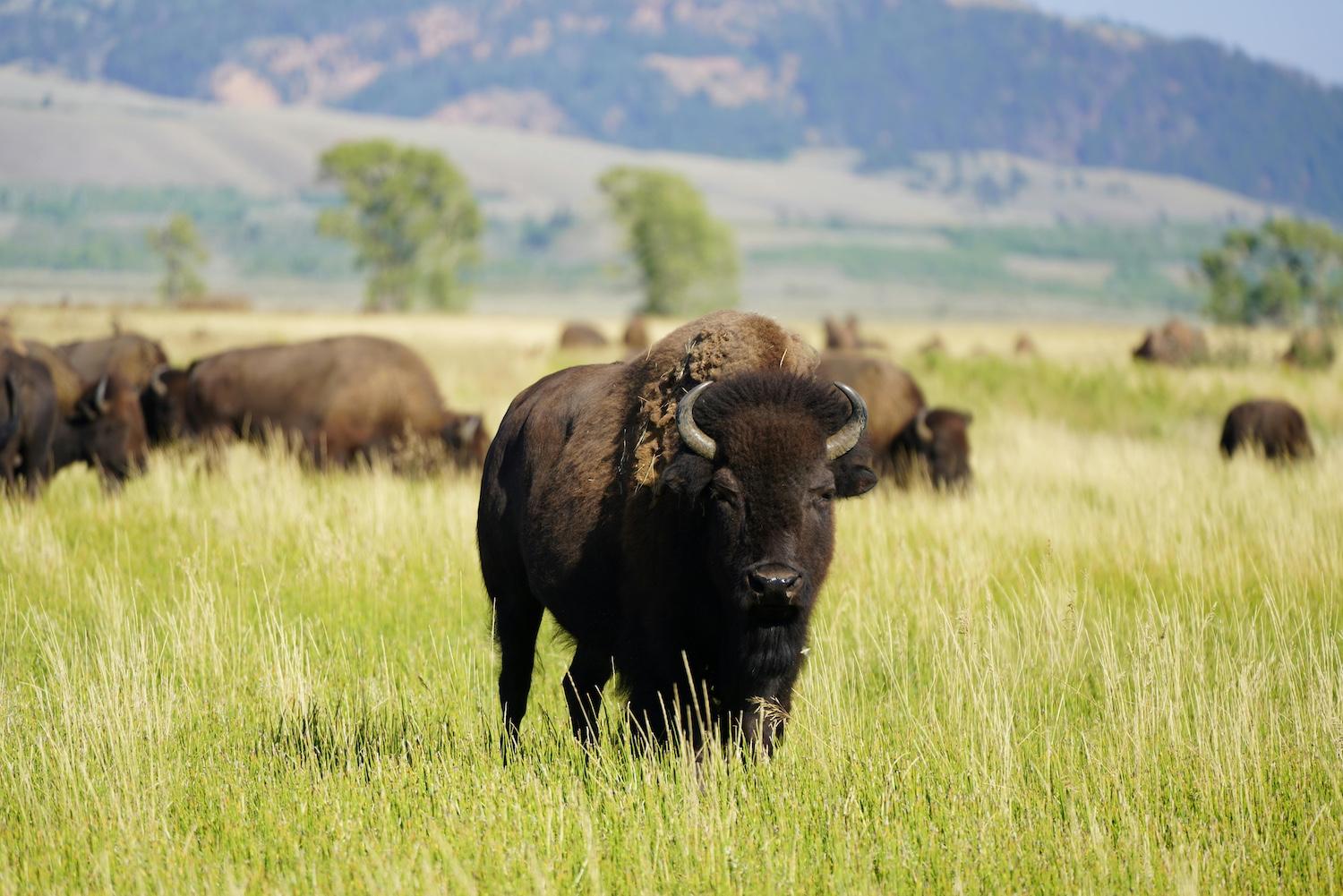
(Image: Enchanted Earth/Pexels)
The history of the Blackfeet Nation and the free-roaming buffalo on its territory is deeply intertwined with the history of colonization of the United States. Before the colonizers came to the Blackfeet territory in the 1800s, buffalos sustained the Blackfeet tribe, which respectfully hunted the animals for food and cultural practices. With colonization came a buffalo genocide led by the U.S. army, enlisting hunters from around the world to eradicate over 40 million buffalo between 1830 and 1865.
The loss of the buffalo population unsettled the Blackfeet Nation for generations, causing starvation, cultural genocide, and struggle for its land, as was the intention of the U.S. government. Since then, the struggle for human rights and land rights has been long and difficult, but a successful initiative has started returning free-roaming buffalo to 36,000 acres of land on the Blackfeet Reservation seeks to fill the gap that the buffalo genocide left two centuries ago.
In June of 2023, two dozen buffalo were released into the wild in the Ninnistaakoo, or Chief Mountain, area, making it the first time since 1873 that buffalo roamed free in the territory.
“The tribe, with the help of NGOs, set aside 36,000 acres of land on the Blackfoot Reservation and wanted to have free roaming buffalo on there,” said Tyson Running Wolf, co-founder of Blackfeet Eco Knowledge, an environmental sustainability nonprofit that collaborated with the Blackfeet Nation on the project. “That land is totally intact and has all of the original grasses and habitat area.”
The initiative is a victory for Blackfeet Nation sovereignty, as the return of the buffalo will allow many cultural practices to return. After centuries of Indigenous genocide, returning the buffalo is a solution to how the Blackfeet have been historically torn away from their own cultural practices and forced to assimilate into the culture of the colonizer.
“The buffalo is basically a key species to us, not just to the land, but to the people,” Lona Running Wolf, co-founder of Blackfeet Eco Knowledge, told Triple Pundit. “Our ceremonies, our songs, our practices are so intertwined with the buffalo, as well as our origins stories. We've lost the cultural piece to who we are, and that has disconnected us from our land … We were stewards of the land because the buffalo taught us how to be that way.”
The absence of buffalo in the territory was changing the equilibrium of the ecosystem. The re-introduction of the species will improve the general health of wildlife in the area.
“The area that we're talking about is used for grazing a lot of different cattle,” Lona said. “Herds graze throughout the reservation, so [the project] was an effort to try to take some area of our reservation and preserve the land, so that we could get it back into pristine shape so that we could release the bison into that landscape. Part of the work that [buffalo] do is cleanse the ecosystem or the ground.”
Though it is too early to know the impact of the Blackfeet Nation’s efforts, other ecological monitoring of similar projects shows that areas where buffalo roam are more likely to grow trees because the animals graze back grasses, clear invasive plants and create biodiverse wetland clearings.
The initiative also protects the land from cattle grazing and oil and gas exploitation, and it follows a tradition of land protection for the tribe. In 2023, the Blackfeet Nation succeeded in expelling oil and gas drilling from the Badger-Two Medicine area, a battle for land preservation that lasted 40 years.
“We wanted to heal the land after the conservation settlement by adding the buffalo, but we also wanted to make it accessible for our members to go back there and be able to harvest buffalo and start practicing our traditional hunting ceremonies that were on the brink of being lost,” Tyson said. “Once we re-established buffalo back there, then oil and gas development and other activities of development can be stopped because we have now established our continued use of hunting in interaction with buffalo in the Badger-Two Medicine area.”
The Blackfeet Eco Knowledge founders also campaign for an increase in Indigenous voices when discussing and making climate change policy. As they wrote in an op-ed for Time Magazine this year, world leaders have a lot to learn from how Indigenous groups have preserved the ecosystems on their lands, which are key in the fight to reduce carbon emissions.
Indigenous political representation is important because the human relationship with the land — which today is largely about exploitation and profit — needs to shift to solve the climate change crisis, Lona said.
“What we don't hear in these conversations is that we need to change the mindset of humans and how they interact with the land,” she said. “We're missing the boat when we're not thinking about changing that human piece. That's why [Blackfeet Eco Knowledge] works on cultural revitalization, and why we're trying to reconnect our people to our language. So they can rebuild that sense of stewardship of the land and understand their role in the universe.”

Nicole Froio is a writer and researcher currently based in Rio de Janeiro in Brazil. She has a doctorate in Women's Studies from the University of York. She writes about gender in pop culture, social movements, digital cultures and many other topics.














